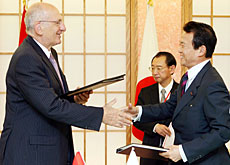Swiss and Japanese explore future trade ties

Delegations from Switzerland and Japan are this week meeting for the fourth time to negotiate a free trade agreement between the two countries.
With themes such as the environment and innovation, the head of the Swiss delegation, Ambassador Luzius Wasescha, tells swissinfo the talks in the town of Thun are breaking new ground.
Launched at the beginning of 2007, the trade negotiations should be completed in the second half of next year.
If they succeed, they will result in the most import trade treaty for Switzerland after the Swiss accord with the European Union.
swissinfo: How do these negotiations with Japan differ from other bilateral accords Switzerland has signed?
Luzius Wasescha: We are trying to play a pioneering role with this accord. Trade policy in the future will have to take into account many domains, including development, the environment and human rights. That will complicate trade policy at the same time as making it more global.
We are trying to mark out a way to tackle these issues with our Japanese partners.
Future negotiations within the framework of the World Trade Organization will also concern new areas such as research and innovation, the guaranteed supply of water or access to resources such as energy. These are extremely delicate issues that we are also tackling with Japan in the framework of this agreement.
swissinfo: The trade balance between Switzerland and Japan is largely in Switzerland’s favour. Does the trade agreement aim at balancing this out?
L.W.: No. In a world of trade that has become global, bilateral balance is not a goal to be reached. But if you take [for example] the customs duties on Japanese cars sold in Switzerland, the free trade agreement should result in a substantial cut to these taxes. That will stimulate sales of Japanese cars in Switzerland.
People are often unaware of Japan’s economic importance but it is the second largest economic power in the world. It is essential for Switzerland to diversify its economic ties. Our centre of gravity is naturally the European Union. But we want to develop strong relations with countries like Japan or the United States and afterwards Canada, South America, the rest of Asia and, I hope, Africa.
swissinfo: These bilateral accords are generally favourable to the more powerful of the two partners. What is the situation with an accord between Switzerland and Japan?
L.W.: It’s not in the nature of the Japanese negotiator to want to impose a solution at all costs. We are very lucky to have a very good negotiating climate between partners who respect each other. We are therefore looking for solutions that will benefit both countries.
Having privileged access to the Japanese markets is an important plus for Switzerland. If our innovative products manage to make their presence felt in Japan, which is a difficult market, it means that they are in a position to fight all the competition.
swissinfo: Bilateral accords are important for Switzerland. But isn’t the increase in them a handicap for multilateral negotiations at the WTO?
L.Z.: There is an obvious synergy between the negotiations at the WTO and those held outside the WTO framework. But if we have, for example, 36 systems of trade regulations in the world [that have come out of preferential bilateral accords], the economic players will end up discovering the discreet charm of the WTO’s multilateral system.
swissinfo: There are a number of leaders, including the WTO’s director-general Pascal Lamy ,who feel that an agreement is possible in the Doha Round of liberalisation talks, which have been stalled for a long time. Do you share this optimism?
L.W.: Up to a certain point. Since September and for the first time, WTO members are negotiating seriously. This ought to permit a basis for consensus on the least controversial issues.
But I am not sure if there is enough time to wind up everything in the first half of next year.
The danger is that the groundwork of the negotiations might become obsolete. The more we delay in concluding these negotiations, the more we’ll need to add new elements to this groundwork and that will make the whole discussion process more complex.
swissinfo-interview: Frédéric Burnand, Geneva
Japan is Switzerland’s third most important trading partner after the European Union and the United States.
Swiss investment in Japan totalled SFr7.7 billion ($6.98 billion) in 2005. Japanese investment in Switzerland in the same year was SFr1.1 billion.
Switzerland is the fifth-largest foreign investor in Japan.
Bilateral relations go back as far as 1864.
During the Second World War, Switzerland represented the interests of a group of about 20 countries in Japan, including Allied powers. At the same time, it represented Japanese interests with the Allies.
The two countries have a number of bilateral accords, covering such issues as air traffic, visas and double taxation.

In compliance with the JTI standards
More: SWI swissinfo.ch certified by the Journalism Trust Initiative




You can find an overview of ongoing debates with our journalists here. Please join us!
If you want to start a conversation about a topic raised in this article or want to report factual errors, email us at english@swissinfo.ch.